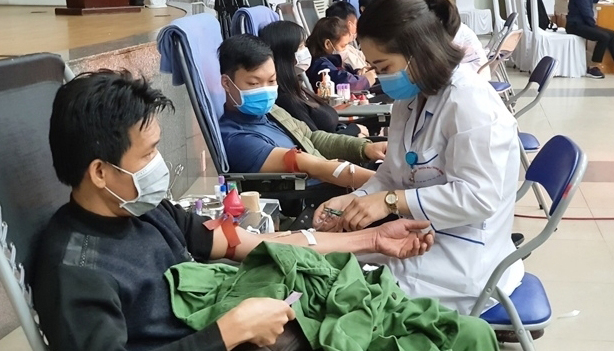Twenty-year implementation of "All-people blood donation day"
ABO/NDO - Today marks the 20th anniversary of the Prime Minister's decision on choosing April 7 as “All-people blood donation day” (April 7, 2000 - 2020). This is considered an important turning point for the voluntary blood donation movement, demonstrating a strong change in awareness, action from authorities and mass organisations from the central to local levels as well as people from all walks of life.
 |
| The entire country collected over 16 million units of blood in the 2000 – 2019 period. (Illustrative image) |
According to Assoc. Prof. Dr. Nguyen Thi Xuan Thu, President of the Vietnam Red Cross Society (VRCS) Central Committee, April 7 has become an occasion to raise public awareness of the purpose and significance of blood donation.
Thu, who is also Standing Deputy Head of the National Steering Committee for Voluntary Blood Donation, said that the day also aims to encourage and mobilise people from all walks of life to voluntarily donate blood, thus creating a pervasive influence among the whole society.
However, in the current period, blood donation activities should be organised in small-scale donation locations during different time frames in accordance with the preventative measures against the COVID-19 pandemic to ensure safety for blood donors.
20 years after the launch of the “All-people blood donation day”, the blood donation movement has achieved encouraging results, contributing to the cause of protecting, caring and improving the people's health.
The entire country collected over 16 million units of blood in the 2000 – 2019 period. Over 300,000 units of blood were donated in 2000, and the number increased to over 600,000 in 2010 and over 1.4 million units in 2019.
The rate of voluntary blood donation was nearly 31% in 2000, 98.3% in 2019 and is expected to reach 99% in 2020. The percentage of the population donating blood increased from 0.3% in 2000 to 1.5% in 2019 and it is anticipated to reach 1.6% by the end of 2020.
In addition, a nationwide network to motivate people to donate blood has been formed, with 100% of provinces and cities establishing provincial and district-level Steering Committees for blood donation and 85% of communes and wards having Steering Committees for blood donation.
Many large blood donation campaigns and events have created a strong impression among the people and received a warm response from various localities nationwide, including the Red spring festival, Red blood in summer, Red journey, Red Sunday, World Blood Donor Day (June 14), and others.
Dr. Bach Quoc Khanh, Director of the National Institute of Hematology and Blood Transfusion said that the COVID-19 pandemic has evolved in many localities after the Lunar New Year, creating serious impact on all aspects of society, including the donation and reception of blood for medical emergency and the treatment of patients.
During this period, activities regarding voluntary blood donation must ensure safety for donors and blood supply for treatment while complying with the requirements of prevention and control of the pandemic in the community.
The National Steering Committee for Voluntary Blood Donation has closely worked with the health sector to update all concerned regarding the pandemic situation and issue guidance documents on propaganda and advocacy for voluntary blood donation in a bid to ensure blood for emergency and treatment needs. Communication forms have been diversified to respond to the pandemic situation and make people feel secure and happy to participate in blood donation.
The size and time for blood donation have been adjusted to avoid gatherings of many people at the same time while the donation sites must be spacious and airy with hand washing sinks. In addition, information on the prevention and control of the pandemic is also published at blood donation locations.
In response to the All-people blood donation day (April 7) amid the pandemic, several localities have held voluntary blood donation according to the appointment.
Accordingly, prospective blood donors make an appointment by phone or social networking applications. They will be called back to verify their information and can thereafter donate blood.
(Source: NDO)
 về đầu trang
về đầu trang







